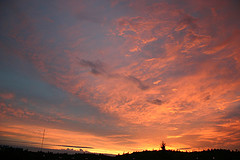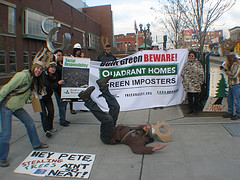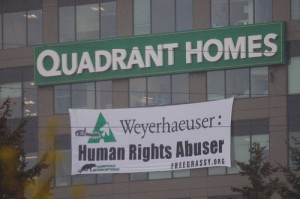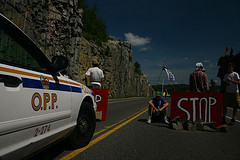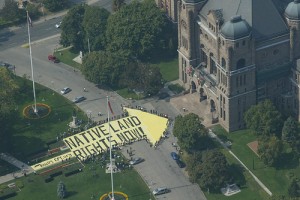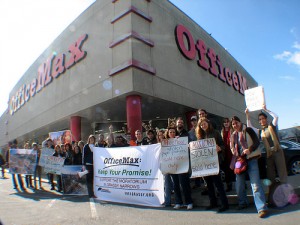RAN doesn’t have big campaign victories every day. We are definitely a very talented group of people who work with very talented activists, organizers, ally organizations, and community members every day, and we celebrate our successes when they happen – readers of this blog definitely know this to be true. But a victory as big as AbitibiBowater pulling their logging operations out of Grassy Narrows, which happened just two weeks ago, is big enough to warrant a look back at the huge group of people that poured a tremendous amount of energy into the campaign over the years. Here’s that reflection:
Campaign background
Launched in 1992, the Old Growth Campaign is the oldest campaign at RAN. Our first major victory came in 1999, when it obtained a groundbreaking commitment from Home Depot to phase out the purchase of old-growth wood. Major brands throughout the forest products industry soon followed suit, including companies like Lowe’s, 84 Lumber, Centex, KB Home, and others.
The campaign then moved on to Boise Cascade, another major purchaser of old-growth wood. In 2004, Boise became the first major forest products company to establish a policy against old-growth logging within the United States.
After the Boise Cascade win, the Old Growth Campaign decided to target Seattle-based Weyerhaeuser Corp., the largest lumber company in the world. Weyerhaeuser obtains a significant percentage of its wood from clear-cuts of Canada’s Boreal Forest. More than 10 times the size of California, the Boreal stretches across North America from Alaska to the Atlantic Ocean and forms part of a ring of forest that encircles the entire planet just below the Arctic tundra. It is also the largest terrestrial storehouse of organic carbon – a critical defense against global warming.
Targeting Weyerhaeuser also meant that we could profile the Grassy Narrows First Nation as an example of Weyerhaeuser’s disregard for human rights and environmental protection. The Grassy Narrows community’s traditional territory includes 2,500 square miles of forests, lakes and rivers in northwestern Ontario. The community has struggled against industrial development and destruction of their territory for decades. In 2002, after years of negotiating with the Ontario provincial government and corporations logging on their territory, filing lawsuits to assert sovereignty over their land, and speaking out against the many health, economic, cultural and environmental effects of extractive industry on their land, the youth in Grassy Narrows decided to blockade one of the logging roads on their territory. That blockade is still active today, and stands as the longest running Indigenous logging blockade in Canadian history. The people of Grassy Narrows have stood firm in their demand to determine the future of their land, and in January of 2007 demanded a full moratorium of all industrial activity on their territory. RAN has worked in close partnership with the Grassy Narrows community since 2003, and our relationship with the community has taught all of us at RAN great deal about the importance of taking leadership from communities that are on the front lines of environmental destruction.
On Tuesday, June 3 we got word that AbitibiBowater, the Canadian logging company that is responsible for all of the logging on Grassy Narrows would immediately stop logging on the Grassy Narrows territory because of the conflict with the First Nation community. This was a huge victory for the people of Grassy Narrows, the Old Growth team, and all of the many activists who have taken part in this effort, as our years of hard work targeting Weyerhaeuser, OfficeMax, Grand & Toy and the Ontario government finally means the end of logging in Grassy Narrows – at least for now. We are thrilled and proud to have been a part of the struggle for Indigenous rights for Indigenous people in Canada and the Grassy Narrows First Nation – and we intend to continue to support these struggles in our campaigns in the future.
Campaign strategies
When we decided to target Weyerhaeuser, we wanted to do what RAN does best, pressure Weyerhaeuser in the marketplace. Because Weyerhaeuser is a U.S. based logging company, and most of the wood products from their operations in Canada are destined for the US consumers, we thought that Weyerhaeuser would be a great target for a RAN campaign.
No Weyerhaeuser Grocery Bags!
The Old Growth campaign started out by putting pressure on grocery stores that sold paper bags made by Weyerhaeuser. The campaign was especially strong in southern California where a RAN chapter protested outside of their neighborhood Wild Oats health food stores until they successfully pressured them to stop using Weyerhaeuser bags. Soon after Wild Oats moved away from Weyerhaeuser bags, Trader Joes followed suit.
RAN’s Home-Builder Strategy
Next, the campaign looked to Weyerhaeuser’s home-building subsidiaries in the United States. Weyerhaeuser owns five home-building subsidiaries across the United States, all of which use wood logged in Grassy Narrows in their construction. Activists in Los Angeles, the San Francisco Bay Area, Seattle and Washington D.C. protested in front of new homes and model homes to put pressure on the subsidiaries to stop building American dream homes from a Native nightmare!
The campaign escalated our protests against these home-building subsidiaries, especially Quadrant homes, which is based in the Seattle area, Weyerhaeuser’s home-town. In February 2007, two RAN activists got significant media attention when they climbed on the roof of a Quadrant Home in a Seattle suburb and refused to leave until Weyerhaeuser pulled out of Grassy Narrows. The two were arrested by police with a fire-fighter’s ladder after several hours, just as helicopters from Seattle area television stations arrived – they were live at 5! RAN also targeted Quadrant’s headquarters in Bellevue, Washington in the spring of 2007 the day before Weyerhaeuser’s annual shareholder meeting, by dropping a banner reading “Weyerhaeuser: Human Rights Abuser.”
Organizing in Canada
In the summer of 2006, the Old Growth campaign hosted an incredibly successful summer internship program in Grassy Narrows. Nine interns from North America spent the summer living in Grassy Narrows on the blockade site learning about the culture, and supporting the struggle of the Grassy Narrows First Nation. In July, the interns along with Grassy Narrows community members and activists from Ontario blockaded the Trans-Canada highway in Kenora, Ontario. The action got attention from Canadian press, and was an incredibly bold statement for Indigenous rights in Canada.
During the campaign, RAN coordinated a number of actions in Canada to highlight the importance of Indigenous land rights. Besides the Trans-Canada blockade, we erected a tepee on the lawn in front of the Ontario Legislative building in Toronto reading “Native Rights Now!,” and we organized a march in coalition with the Christian Peacemaker Teams to unfurl a giant yellow arrow pointing toward the Legislative building reading “Native Land Rights Now.” That banner, which we took aerial photos of, has become iconic of the campaign. Most recently, RAN was integral in organizing a week-long camp out in front of the Ontario Legislative building which included representatives from Grassy Narrows, Kitchenuhmaykoosib Inninuwug (KI), and the Ardoch Algonquin First Nations in Ontario. A coalition of over a dozen environmental, human rights, and faith organizations in Canada also participated.
Targeting Boise, OfficeMax and Grand & Toy
This past winter, the campaign decided to pivot our focus away from Weyerhaeuser for a moment, and to direct attention to Boise Inc., a company that we had targeted just a few years ago. This time we demanded that Boise stop purchasing pulp from Grassy Narrows. Boise is the other major purchaser from AbitibiBowater, other than Weyerhaeuer, of wood products from Grassy Narrows. We decided to target Boise’s retail presence by organizing a day of action against OfficeMax locations in the United States, and Grand & Toy locations in Canada. The day of action was a huge success, with 34 actions taking place all over North America at the end of January 2008. After the success of the day of action, our attention turned to a group of students at Ohio State University in Columbus who were engaged in a long-running campaign to get their campus to purchase sustainable forest products, excluding copy paper from OfficeMax as long as it was made from wood from Grassy Narrows.
At the end of February we had a major victory when Boise announced publicly that they would no longer purchase pulp coming from Grassy Narrows through logging company AbitibiBowater.
Campaign Accomplishments
Over the course of the campaign, Weyerhaeuser made a few significant changes to the way that they do business that are positive, but have gone without much fanfare on our part. Weyerhaeuser is no longer operating in important rainforests in British Columbia, and when they merged their paper division with Domtar, a Canadian logging company that is committed to FSC certification, it meant that forests now logged under Domtar’s management will have to meet more strict forest management practices.
It has been such an honor to work with so many amazing people on this campaign in the two years that I’ve been at RAN. I have been continually amazed by the level of commitment brought to this work by people all over North America, whether they are people who have spent time in Grassy Narrows, long time forest activists, students, donors or people willing to stand in 100 degree heat with a banner because Indigenous rights is an issue that is critically important to all of us. The people of Grassy Narrows have been struggling to protect their culture, their land, and their rights for decades, and AbitibiBowater’s announcement, while significant, is not the end of the work that remains to be done. I hope that we all can look at this campaign and think about how we can continue to support the community in Grassy Narrows, and apply what we have learned to our work in the future.
-Annie
